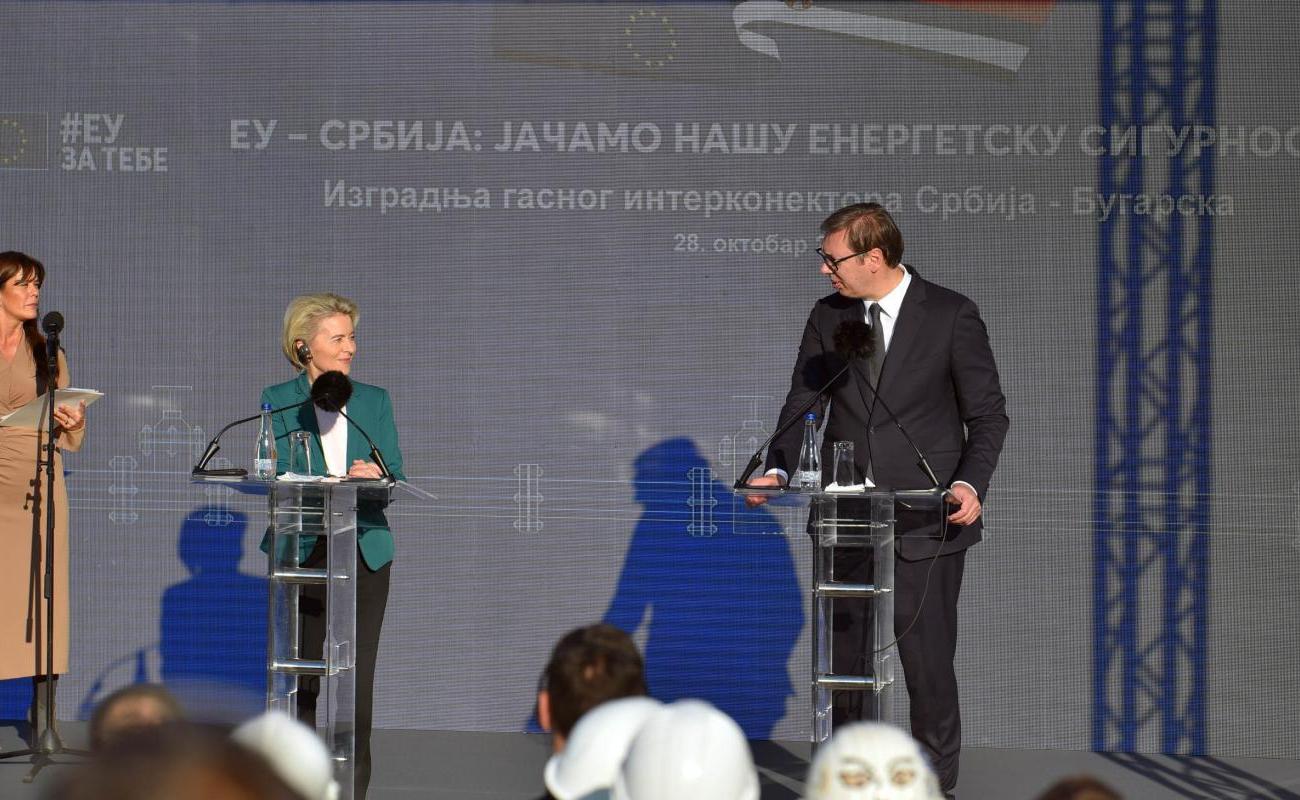165 Million Euros of EU Direct Budget Aid for Energy

The European Union will provide Serbia with EUR 165 million in direct budget support so that citizens and the Small and Medium Enterprises can purchase energy sources and deal with the current energy crisis, announced the President of the European Commission, Ursula von der Leyen, during a tour of the works on the gas interconnector near Niš.
“I think this is necessary so that Serbia, like other countries, can support the vulnerable parts of society, so that they can cope with the higher prices of energy products,” said Von der Leyen.
Full statement of the President of the European Commission
The President of the Commission states that this is a short-term solution to current problems, but that it is necessary to work additionally on the strategic strengthening of energy security, regional and European connection and diversification of gas sources.
The new gas interconnector Serbia – Bulgaria will make it possible for the country and the region to receive gas from different sources. The project was partially financed through EU grants, in the amount of 49.6 million euros, as well as a 25 million euro favourable loan from the European Investment Bank, which Serbia will pay for the part of the gas pipeline that passes through Serbia. So far, the Republic of Serbia has allocated 15 million euros for this project and 7.5 million euros for preparatory work and design.
Gas supply is important for citizens and the economy. Gas partially provides heating for homes, and it is also needed for the operation of numerous economic branches. Gas makes up 13 percent of primary energy consumption in Serbia, which can currently only get it from two entry points – through the Balkan Stream gas pipeline and from Hungary. The gas interconnector, which connects the gas networks of Serbia and Bulgaria, will increase the diversification of energy sources in Serbia and the Western Balkans region, enabling Serbia to have a more secure and stable supply from different gas network systems, especially from Azerbaijan and the future LNG terminal in Alexandroupolis, Greece, which can receive gas from all over the world.
"We are already together in the Energy Union. Whatever the EU does, the Western Balkans is included, as we are so connected that the actions of both sides affect each other. If something happens in the EU, it has an impact on the Western Balkans, if something positive happens here, such as the gas interconnector, it has a positive effect on the entire Union,” said the President of the Commission.
She also reminded of the importance of diversifying energy sources, after Russia reduced the delivery of gas by over 100 million cubic meters. The head of the EC also announced long-term investments worth over 500 million euros in the energy connection of Serbia and the region.
Von der Leyen also highlighted the EU-supported construction project for the new modern children’s hospital Tiršova 2, and one of the important elements of that facility will be the building’s energy efficiency.
“Over 40 percent of emissions are caused by buildings that are not well insulated. The better we build buildings, the better for the climate, but it’s also better for energy efficiency.”
The President of Serbia, Aleksandar Vučić, emphasised how important EU assistance is in this area and expressed his gratitude to the Union.
"Thank you for your enormous support and help. We just found out that we will receive direct budget aid. It is a lot of money for us. Thank you very much for your support. You will ease the problems we are facing,” said President Vučić.
The President of the European Commission also met with the Prime Minister of Serbia, Ana Brnabić, as well as the Ministers of Mining and Energy, Dubravka Đedović and Tanja Miščević, who will be in charge of European integration.
Brnabić emphasized in the conversation that the new energy policy is the first priority of the new government, and that the issue of further energy diversification will be in focus.
The Prime Minister said that the European Commission’s Report on Serbia’s progress is objective and balanced, and that the Government will continue to be committed to reforms and the process of European integration in the new mandate.
